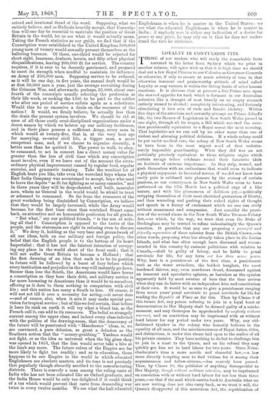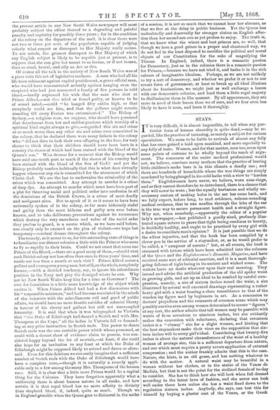LOYALTY IN CONVULSION FITS.
rr HOSE of our readers who will study the remarkable facts I narrated in the letter from Sydney which we print in another column, will agree with us that it is high time we should deal out a few Royal Princes to our Colonies as Governor-Generals or otherwise, if only to ensure as much sobriety of tone in that otherwise innocent and praiseworthy attitude of mind called Loyalty as may restrain it within the fitting limits of other human emotions. It is obvious that at present a live Prince acts upon the starved appetite for rank which is dormant in our Australian.. colonists, like a draught of neat brandy on an empty stomach- entirely unused to alcohol ; completely intoxicating, and furiously stimulating it into acts of rude and frantic idolatry. Within five days of the atrocious and cowardly attempt on Prince Alfred's life, the two Houses of Legislature in New South Wales passed in one night, through all its stages, a Bill which received the sanc- tion provisionally equivalent to a Royal assent the next morning. That legislative act we can call by no other name than one of violent and alarming political delirium. If a whole colony could be put under medical care, the colony of New South Wales seems to have been iu the most urgent need of that unfortu- nately impossible guardianship. What they did was an act politically precisely equivalent to those religious orgies which certain savage tribes celebrate round their favourite idols on festivals of extreme importance. As they strip, wound, and gash themselves with an enthusiasm that would seem to indicate a physical enjoyment in lacerated nerves, if we did not know how easily pain is sublimed into pleasure by the ecstasy of certain passions, so our countrymen in New South Wales seem to have performed on the 17th March last a political orgy of a like nature, and with like phenomena of delirious joy,—politically stripping themselves of their most cherished guarantees of liberty, and then wounding and gashing their naked rights of thought and speech in a frenzy of excitement which no one can study without amazement and compassion. Just consider the provi- sion of the second clause in the New South Wales Treason-Felony Act,—to which, by the way, we trust that even the Duke of Buckingham may be trusted to refuse unhesitatingly the Queen's sanction. It provides that any one proposing a peaceful and' friendly separation of these colonies from the British Crown, in other words, proposing what has already taken place in the Ionian Islands, and what has often enough been discussed and recom- mended in this country by eminent politicians with relation to Canada,—shall be guilty of felony, and be liable to penal servitude for life, for any term not less than seven years. Why, here is a punishment of the first class, a punishment such as the worst swindlers, the boldest burglars, the most hardened thieves, nay, even murderers dread, denounced against an innocent and speculative opinion, as harmless as the opinion apparently held by most swarms of bees that the time arrives when they can do better with an independent hive and constitution of their own. It would be as sane to give a punishment ranging from seven years' penal servitude to penal servitude for life for reading the Republic of Plato as for this. Then by Clause 9 of this insane Act, any person refusing to join in a loyal toast or demonstration to Her Majesty shall be deemed guilty of a misde- meanour, and may thereupon be apprehended by anybody without warrant, and on conviction may be imprisoned with or without hard labour for any period under two years. Why, any old- fashioned Quaker in the colony who honestly believes in the equality of all men, and the mischievousness of Royal duties, titles, and distinctions, is under this clause laid open to the malice of all his private enemies. They have nothing to do but to challenge him to join in a toast to the Queen, and on his refusal they may quickly get him set to hard labour for two years. Since Nebu- chadnezzar's time a more servile and shameful law,—a law more directly tempting men to find victims for it among their acquaintances and fellow-citizens,—has scarcely been passed. Then, by Clause 10, the publisher of anything disrespectful to Her Majesty, though without seditious intention, may be imprisoned on conviction with or without hard labour for not less than three years,—so that if the mail which carries back to Australia what we are now writing does not also carry back, as we trust it will, the Queen's disapproval of this monstrous Act, the republication of
the present article in any New South Wales newspaper will most probably subject the editor thereof to a degrading and painful penalty and captivity for possibly three years ; for in the condition of the colony on the departure of the mail, it is clear there were not two or three per cent. of the population capable of judging soberly what respect or disrespect to Her Majesty really means. To our minds, the grossest disrespect to Her Majesty of which any English subject is likely to be capable just at present, is to suppose that she can give her assent to so insane, or if not insane, then so cruel, brutal, and silly an Act as this.
Of course all the talk in the society of New South Wales was of a piece with this act of legislative madness. A man who had all his life been vehement against capital punishment, a grave official man, who would have remonstrated ardently against hanging even the shepherd who had just massacred a family of five persons in cold blood,—loudly expressed his wish that the man who shot at Prince Alfred,—not then tried or found guilty, or known to be of sound mind,—could " be hanged fifty cubits high, so that everybody could see him, and that the gallows might remain standing till every Fenian was exterminated." The Bishop of Sydney,—a religious man, we suppose, who should have possessed that detachment from hot and sudden passions which worship of a spiritual kind ought always to give,—regarded this sin and crime as so much worse than any other sin and crime ever committed in the colony, that he declared there were many fathers in the colony who " did not dare to look their own offspring in the face, for very shame to think that their children should have been born in a country the shores of which had been stained with the blood of the Queen's son." Who dreams for a moment that the Bishop would have said one-tenth part as much if the shores of his country had been stained with the blood of the Son of God ? and yet the Bishop probably teaches habitually that this is what does virtually happen whenever any sin is committed for the atonement of which Christ died. We are the last to undervalue the criminality of the crime which was committed. Any attempt to murder is a crime of deep dye. An attempt to murder which must have been part of a plot for throwing social and political order into confusion in all the dominions of the British Crown, is a crime of most deadly and malignant aims. But to speak of it as it seems to have been universally spoken of in the colony, as far more hideously sinful and guilty than the most hideous and guilty acts ever before known, and to take deliberate precautions against its recurrence which destroy the very sacredness and value of the social order they profess to guard, is a course which, as we have said before, can clearly only be excused on the plea of violent—we hope but temporary—cerebral disease throughout the colony.
The remedy, as it seems to us, for this astounding state of things is to familiarize our distant colonies a little with the Princes who seem to fly so rapidly to their brain. Could we not enact that some one Prince of the Blood,—there are a good many of them,—should visit each British colony not less often than once in three years' time, and reside not less than a month at each visit ? Prince Alfred seems a gallant and courageous young man, but still, on the whole, completely human,—with a decided tendency, say, to ignore his subordinate position in the Navy and play the demigod where he can. Why not let New South Wales keep him for a time as Governor ? The cure for fanaticism is a little more knowledge of the object which excites it. When Prince Alfred had had a few discussions with his " responsible ministers," and had become associated in the minds of the colonists with the miscellaneous evil and good of public affairs, we should have no more frantic suicides of colonial liberty in honour of his cheery and gallant but still not unexampled humanity. It is said that when it was telegraphed to Victoria that " the Duke of Edinburgh had danced a Scotch reel with Mrs. Thompson at the Cape," all the ladies in Victoria fell to demand- ing at any price instruction in Scotch reels. The power to dance Scotch reels was the one enviable power which whoso possessed, or could with a decent show of evidence claim to possess, was con- sidered happy beyond the lot of mortals,—at least, if she could also hope for an invitation to any feast at which the Duke of Edinburgh might be supposed likely to attend and dance as afore- said. Even for this delirium we can easily imagine that a sufficient number of Scotch reels with the Duke of Edinburgh would have been a complete cure,—though it is naturally a remedy appli- cable only to a few among the many Mrs. Thompsons of the human race. Still, it is clear that a little more Prince would be a capital thing for the Colonies. They have forgotten apparently what a uniformity there is about human nature in all ranks, and how certain it is that royal blood has no more affinity to divinity than shepherd blood, if, indeed, quite as much. Though we in England grumble when the Queen goes to Balmoral in the midst of a session, it is not so much that we cannot bear her absence, as that we fret at the delay in public business. Yet the Queen has undoubtedly and deservedly far stronger claims on English affec- tion than her second son can as yet profess to enjoy. The truth is, that we know what the wisest and best princes are, so well, that though we love a good prince in a proper and chastened way, we do not feel in the least disposed to sacrifice the political and moral objects of our Constitution for the sake of magnifying the Throne. In England, indeed, there is a romantic passion for Democracy, just as in the colonies there is a romantic passion for Princes,—because we have not tried it, and bathe it in the rich colours of imaginative idealism. Perhaps, as we are not unlikely to try a sort of democracy, and whether we prefer it or not to our recent form of government, at least to break up all ideal illusions about its fascinations, we might just as well exchange a lesson with our democratic colonies, and lend them a little regal majesty to disillusionize them in like manner. By all appearances, they are more in need of their lesson than we of ours, and we fear even less likely to have it soon, and learn it thoroughly.



































 Previous page
Previous page